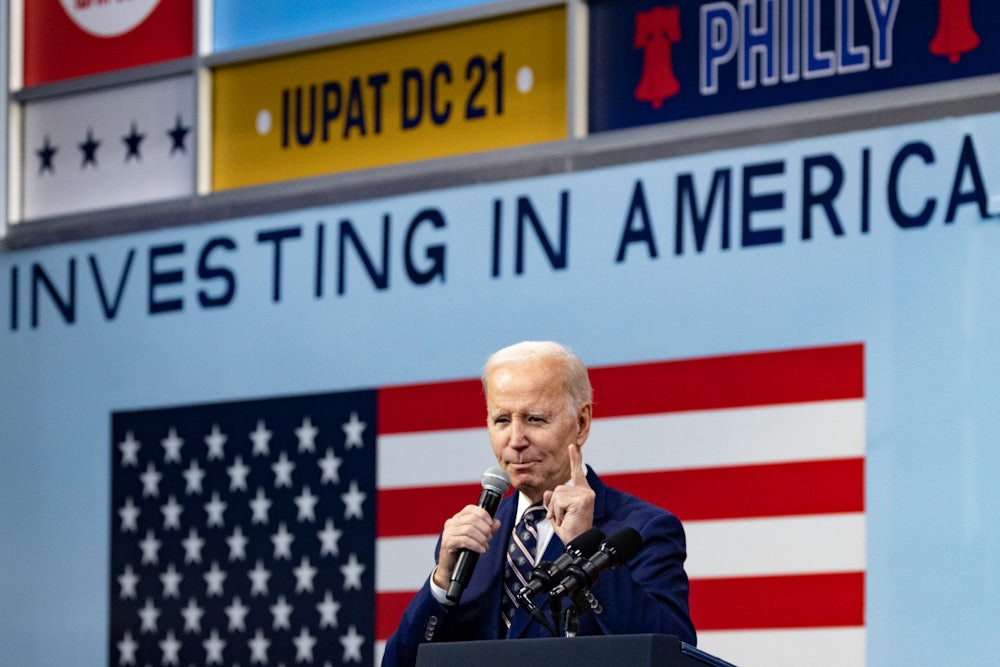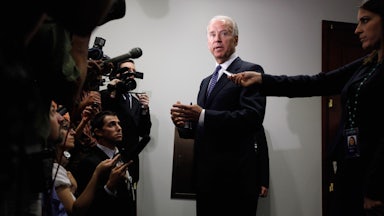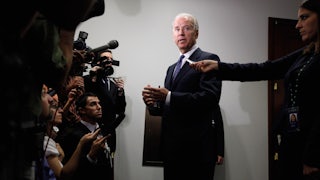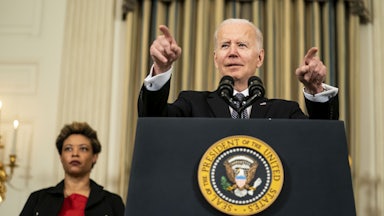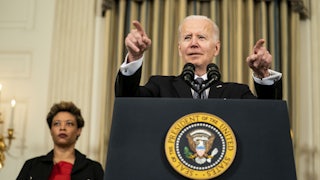President Joe Biden on Thursday unveiled his budget, a sweeping blueprint including proposals to increase taxes on corporations and wealthy Americans. It would revive many of the tax policy ideas of the Build Back Better Act, the president’s failed social spending bill, while also increasing defense spending and aiming to cut the deficit by $3 trillion over a decade. It has no chance of getting passed by Congress.
That’s part of the purpose: A presidential budget proposal is less of a prescription for actual congressional action and more of an indicator of a chief executive’s political priorities. The Constitution vests appropriations with the legislature, not the executive branch. As Republicans control the House, the vast majority of Biden’s ideas are dead on arrival in Congress. But the budget offers everyone—allies and opponents alike—a window into the policy matters on which he intends to focus, while offering a soft launch of a campaign platform as Biden gears up for a likely reelection bid.
“My budget is going to give working people a fighting chance. It’s going to create good-paying jobs. And we can pay for these jobs while reducing the deficit,” Biden said in remarks announcing the proposal in Pennsylvania, a critical swing state. Biden’s budget calls for trillions of dollars in new spending, paired with significant tax increases as offsets, presenting an expansive vision of government that invokes a social policy bill that failed in the last Congress.
Biden’s budget would spend billions of dollars in funding for public housing, free community college, child care, and universal pre-kindergarten, all proposals included in the Build Back Better Act. It would also reinstate the enhanced child tax credit expanded by a 2021 coronavirus relief measure, which contributed to a dramatic cut in child poverty during the one year that it was in effect.
The budget also includes an increase to Medicare tax rates for people earning more than $400,000 per year in an effort to keep the program solvent and expand Medicare’s ability to negotiate prescription drug prices. (However, the proposal does not address Social Security, which is also facing insolvency.) It also hikes taxes on large corporations, hedge fund managers, stock buybacks, and billionaires. Representative Richie Neal, the ranking member of the House Ways and Means Committee, approved the budget as “sensible tax policy,” noting that the tax proposals matched what had been produced in his committee last year, when he was still its chair.
While congressional Democrats tacitly acknowledged the political impossibility of Congress actually acting on this wishlist, they nevertheless maintained that it sent a powerful message to Americans about the president’s priorities. It also provides Biden with another clear contrast with Republicans, who have yet to release their own budget proposal.
“I always say that a budget is a statement of values. And President Biden’s budget shows his values are where they always have been, and that is with working people, not billionaires,” Senator Patty Murray, the chair of the Senate Appropriations Committee, told reporters on Thursday. Murray has been a key advocate in the Senate for expanding child care, rolling out a plan with Senator Tim Kaine last year in the hopes of getting it included in the bill which became the Inflation Reduction Act.
Expanding child care is popular with Americans, Kaine told me, arguing that it could help address labor shortages. “I think making the argument that it’s connected to [the] workforce is really important,” Kaine said.
Biden’s budget proposal revives many of the components of the Build Back Better Act, the massive bill which would have overhauled the nation’s tax system and social safety net, and which fizzled in the Senate due to opposition from West Virginia Senator Joe Manchin. Even when Democrats held the White House, Senate, and House, they could not pass this agenda, highlighting the practical futility of Biden’s new budget.
Unsurprisingly, congressional Republicans immediately and vehemently expressed opposition to the proposed budget. “President Joe Biden’s budget is a reckless proposal doubling down on the same far left spending policies that have led to record inflation and our current debt crisis,” said Speaker Kevin McCarthy, Majority Leader Steve Scalise, Majority Whip Tom Emmer, and Republican Conference Chair Elise Stefanik in a statement.
Republicans are hoping to extract spending cuts in exchange for raising the debt limit—which we’ll remind you would not incur any new debts but cover spending already appropriated by Congress. As they have promised not to touch Medicare, Social Security, or Defense spending, Republicans will look to balance the budget likely by slashing programs that benefit poorer Americans, such as Medicaid and food stamps. Ideological disagreements over Biden’s thus budget prefigure the looming debt ceiling crisis. (Presidents of both parties contributed to the more than $30 trillion deficit.) Republicans are already expressing a willingness to toe the line of default, marking up a debt prioritization bill in the House Ways and Means Committee on Thursday.
But Democrats have hammered House Republicans for not yet revealing their own budget proposal. Representative Jodey Arrington, the House Budget Committee chair, told CNN that they might not propose their own budget until May—a full month after they had hoped to pass a budget. Arrington’s office quickly backtracked, saying that there was no current timeline for releasing the budget.
“The House Republican budget plan is in the witness protection program. It’s in hiding,” House Minority Leader Hakeem Jeffries told reporters on Thursday morning. “I think that it’s so extreme that they are afraid to put it in the public domain.” That sentiment was echoed by Senate Majority Leader Chuck Schumer later in the day. “Speaker McCarthy, the president has shown where he stands and where we stand, where do you stand? Where does your Republican caucus stand? Where is your plan?” Schumer asked.
Biden also needled McCarthy in his speech announcing his budget: “I’m willing to meet with the speaker any time. Tomorrow, if he has his budget. Lay it down, tell me what you want to do,” Biden said.
Biden’s budget did produce some areas of consternation for progressive Democrats, including a proposed $842 billion for defense, a 3.2 percent increase from the fiscal year 2023. “We have never believed that continuing to increase the Pentagon budget is the right way to go, and it seems like there’s no accountability around it still,” said Representative Pramila Jayapal, the chair of the Congressional Progressive Caucus.
But overall, said Jayapal, the proposal sends a message to Americans—and potential voters—that he will defend their interests. “It says, ‘I’m a president who’s going to continue to fight for you. I’m going to lower your costs, I’m going to make sure we take on more pharmaceutical drug pricing negotiations, raise taxes on the wealthiest … I’m going to invest in safety nets,’” Jayapal said about the budget. “I think those are all really important messages to say, ‘I’ve got your back.’”
